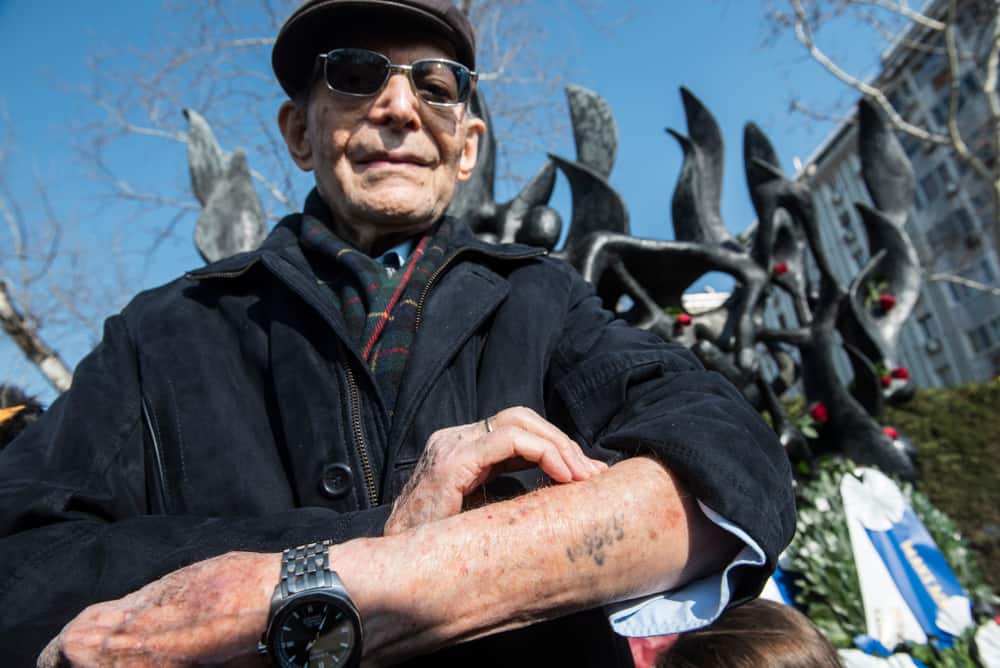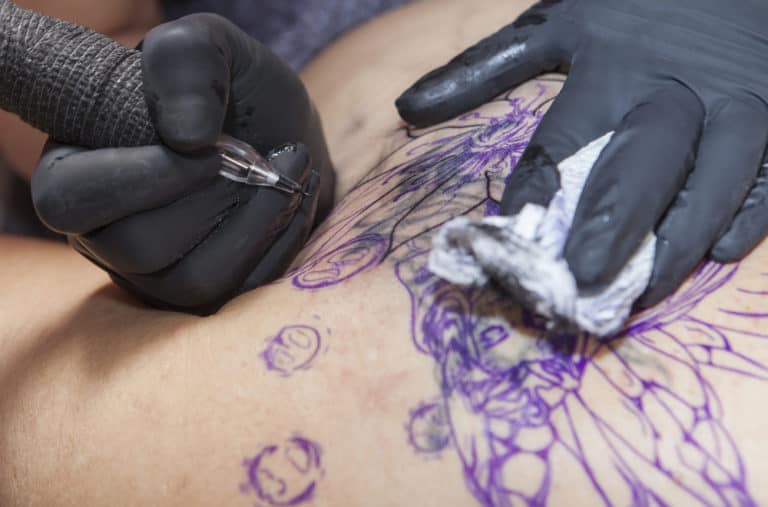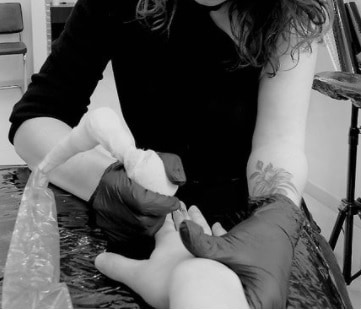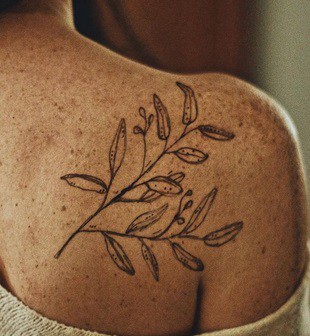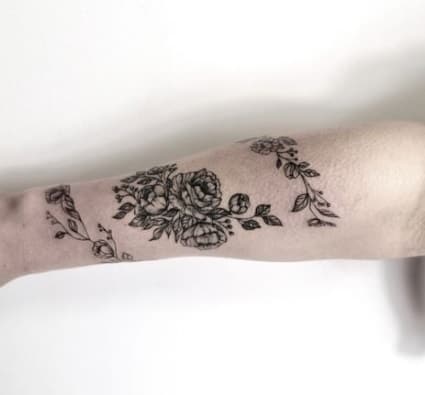Should You Get A Memorial Tattoo?
Grief hits everyone in a unique way. For all the information and advice on mourning our loved ones, there is no singular experience. Nor is the adjustment to living with a loss a linear journey. We all ride the chaotic waters of life after a death in our own way. But some crave a way to hold the deceased in a close and visual form, such as getting a memorial tattoo.
Memorial tattoos can be a profound part of the grieving process. The act of getting a tattoo and the physical connectedness of the piece can bring about necessary emotions. First, however, some crucial decisions, such as placement, names, and dates, should be considered.
Coping in grief requires different touchstones and support structures. For some people, they need to share the story of the person they loved. Talking to people is essential to their grieving process. Thus, a tattoo that will spark conversation about the deceased is an excellent idea. For others, however, such a situation would be akin to pouring lemon juice on an open wound.
6 Reasons Why People Get A Memorial Tattoo
Grief used to come with specific cultural rituals. But in modern times, many of these customs have become fragmented or no longer serve our emotional needs. Tattooing is an old art form that is resurging in popularity, especially as a tool for mourning. While getting inked isn’t for everyone, for some, it can aid the grieving process.
1. Memorial Tattoos Create Stillness
With death comes an avalanche of noise and a cacophony of decisions. It can feel impossible to breathe in such chaotic pain. But the tattoos demand stillness. During the period of being ink, the grieving person has no choice but to stop moving. The act of being tattooed creates a space for feelings to be processed. There is nowhere to go but to think and feel.
2. Memorial Tattoos Allows Pain
Numbness is a common reaction to grief. The ability to feel is put on pause. The temporary lack of sensation is a coping method. It allows people to do what needs to be done. However, there comes the point where the helpful crutch of numbness because a roadblock to healing and learning to live with grief.
For some, the act of being ink allows them to begin feeling again. The pain of the needle echoes the heartache they seem unable to feel. The needle prickles, awaking emotions that had to be shelved. Thus, being tattooed can open the pathways necessary to begin the next stage of the grieving process.
3. Memorial Tattoos Create An Intimacy
Death often brings longing, a yearning for closeness. A memorial tattoo is having memories inked into the skin. This type of tattoo is a deeply personal decision and experience. Thus, for many, the tattoo is a way to hold the deceased close, even after they are gone. Therefore, these tattoos can bring incredible amounts of comfort and solace.
4. Memorial Tattoos Create Control
Death robs us of any illusion of control. Grief can feel chaotic, so much so that many describe it by saying, “I’m drowning.” However, having a tattoo can provide a stabilizing force. Being inked is a decision the wearer has control over, from the design, placement, and when it will occur. The tattoo is something we have chosen, unlike the loss.
5. Memorial Tattoos Create A Permanent Altering
Death creates an emotional earthquake, yet, the body shows no reflection of one of the most painful experiences imaginable. Even more mystifying, the rest of the world marches onwards as if this dramatic loss has not occurred.
A memorial tattoo permanently marks the body, giving a physical reflection of the life-altering event. The memorial tattoo speaks to the pain, giving it a visual marker. Being inked is tangible, visible, and undeniable. It can give the wearer an emotional symbol of the pain they hold.
6. Memorial Tattoos Create A Promise To Remember
Human beings often mark vows or make commitments in public. It is why we throw weddings, making public declarations of commitment and love. Memorial tattoos may follow a similar thought process. They are often done as a way to remember the departed. It is a visual commitment, a promise to remember, always.
The memorial tattoo’s promise of remembrance can ease some people’s guilt as their life continues without the loved one. In a way, the promise grants the wearer permission to make new memories and build a future that does not have the deceased in it.
4 Reasons Why People Caution Against Memorial Tattoos
Not everyone wants a memorial tattoo. Others warn others not to do it. These reasons are not centered around fear of needles or objections to body art. They have concerns that these will be a source of regret or impede grief.
The following are common reasons people do not want memorial tattoos or caution against them. These objections might not apply to you and your situation. A tattoo is always a personal decision, and grief makes it even more so. It is you that will be wearing the ink, not other people.
1. They Worry A Memorial Tattoo Will Prolong Grief
Grief is a process; sometimes, we get stuck, unable to move beyond a particular stage. Some fear that acquiring a memorial tattoo will cause prolonging of grief. They worry about themselves or a loved one getting stuck, dwelling in the loss, and unable to transition to the next stage. “Life is to be lived forward” is a common refrain, and a memorial tattoo is seen as looking backward.
For some, this concern might be worth considering. But for others, the opposite is true. Tattoos and grief are deeply personal, and no two people react the same.
2. They Worry A Memorial Tattoo Will Reopen Wounds
Memorial tattoos are a visual reminder of the person that has died. Thus, some people worry that having the loss inked into the skin will create a resurgence of pain every time they glance at it. But for others, the visual reminder is comforting. How you will feel about the tattoo depends on who you are and how you grieve.
It is also true that tattoos often start conversations, including with strangers. Having a memorial tattoo can create a situation where people often ask, “Who was…?” while the wearer is just trying to go about their day. This can be incredibly painful for some people, while others welcome it. Again, it simply depends on who you are.
3. They Worry A Memorial Tattoo Is An Emotional Decision
Memorial tattoos are an emotional decision, as are many choices in life. However, since tattoos are permeant, there is the concern that being tattooed while grieving will become a choice later regretted.
Regrets are not necessarily about design, per se. It could be about the experience of wearing a memorial tattoo. The fear that during moments of intimacy, people might pause and ask, “Who was…?” Or later wish they hadn’t placed something so personal on such an exposed body part. Maybe they hadn’t anticipated what it would be like seeing a flash of such emotionally charged ink throughout the day.
4. They Believe There Are “Better” Ways To Remember The Dead
Some scorn memorial tattoos, saying there are better ways to remember the dead. Of all the reasons not to get one, this excuse is one of the worst. It presumes that the tattoo excludes other acts, such as planting a tree, donating to charity, or whatever reason they believe is “more appropriate.”
While there are some very valid questions one should ask themselves before getting a tattoo, this objection isn’t one of them. It is a judgmental opinion that in no way serves the person grieving or the person who has died. There is no “best way” to remember the dead. Nor is there only one way to remember our loved ones.
3 Questions To Consider Before Getting A Memorial Tattoo
Memorial tattoos are a decision filled with emotion. However, no hasty decision needs to be made. People contemplating a memorial tattoo should give themselves time, as they would with any piece of inked art.
Also, memorial tattoos do not have to be completed all at once. Ink can always be added, but it is difficult to remove. So, feel free to do the process gradually while you mull over certain details, especially in regards to including names and dates.
1. Where Should I Place My Memorial Tattoo?
The placement of a memorial tattoo is one of the most important decisions. For many, their first consideration is the symbolism of the placement. For example, grieving parents often want their child’s memorial tattoo inked over their heart. Others place tattoos on a ring finger, as it was once believed that there was a vein that traveled straight to the heart (this is a myth).
However, it is also wise to consider the long-term ramifications of placement. Excellent questions to ask are:
- Will I want to see it all the time?
- How much will I want to talk about this tattoo?
An easily visible tattoo, such as on the inside of the wrist and forearm, will constantly be in the wearer’s line of vision. At first, this could be incredibly comforting. The continuous visual helps the grieving person feel close to their loved one.
But for some, seeing a memorial tattoo throughout the day can be painful or distracting. They find it harder to go about daily essential tasks and obligations. For people who fall in the latter, a placement that is easier to cover up is a better fit. For example, a spot on the ankle, thigh, or hip allows the wearer to gaze at the tattoo when they feel they are in a space where it is safe to be emotionally vulnerable.
The other consideration is how often the wearer will feel comfortable talking about the tattoo. Again, it depends on the person. For some, they want to tell the story. They welcome questions about the deceased. Thus, a visible tattoo that will bring about questions from strangers is beneficial. Speaking aloud the story behind the ink helps the wearer keep those memories alive.
For people who do not mind or welcome questions about a memorial tattoo, a visual placement can benefit their grieving process. The visible ink can spark joy through the years as it brings opportunities to tell the story.
However, the idea of constantly being asked about their memorial tattoo is invasive and upsetting for some. For someone like this, the ink and the story behind it is deeply personal, not a story they want to share widely. They want the ability to go about their day without being stopped and asked about an emotional topic.
Again, for those that fall into the latter camp, it is best to place the tattoo in a spot where you have the option to cover it. This will give the wearer privacy. It also allows the wearer to decide when and to whom they share the memory behind the tattoo.
2. Should The Memorial Tattoo Include A Name?
Adding a name to a memorial tattoo can initially sound like an excellent idea. But like questions about placement, it comes with pros and cons. For some, the question is easy: they want the person’s name. Any questions about “Who is?” will be welcomed. Having the name of the deceased spoken aloud is an affirmation.
However, a tattoo that is symbolic of a person comes with some anonymity. For example, a tattoo with a surfboard can easily be passed off to strangers as, “Cool sport.” Nobody needs to know that the tattoo honors a deceased loved one that found joy on the waves. It gives the wearer a choice in sharing the deeper meaning behind the ink.
Names of a deceased lover or spouse can also become awkward for some later in life. As time evolves, bearing the person’s name might not feel as good as it once did. Thus, for those with these concerns, a symbol or a piece of art honoring them might be a better fit.
3. Should The Memorial Tattoo Include Dates?
Dates can add a powerful element to a tattoo. For some, the memorial tattoo is a date, nothing more. However, for others, dates are personal and part of a story they do not always want to share. Like with names and placement, including a date can invite questions or signify to others that the tattoo is one in honor of somebody who died.
Conclusion
A memorial tattoo can be a valuable part of the grieving process and a way to celebrate a loved one’s life. It is a personal decision that can be incredibly profound. At the same time, there are concerns and questions; it’s essential to consider if these apply to you. It is your body and mental health, not anyone else’s. Some people mean well; others are simply judgmental. But in the end, the decision to ink is yours.
Some of my favorite designs, tattoo books, and aftercare products, selected for you
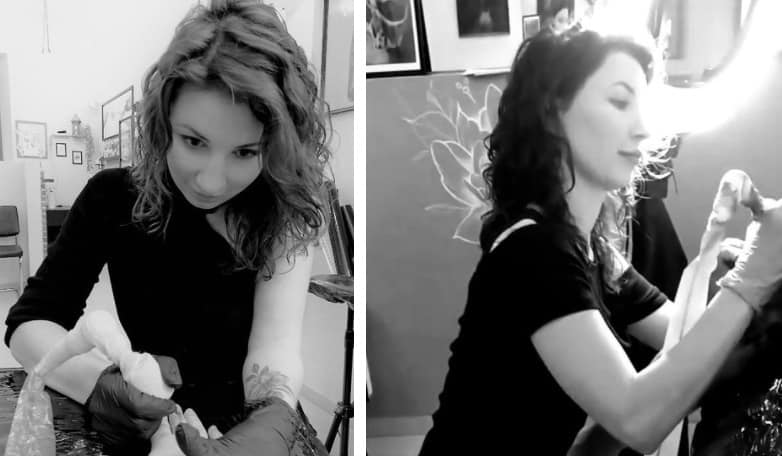
Thank you for reading my article, I hope that you have found it helpful. If you would have trouble finding ideas for your tattoo, wonder what is meaning of design that you have found or what to buy for aftercare, to make sure that your tattoo will be healing quickly and easily, here are some of my favorite products in one place, hope that this will also help.
Design and tattoo ideas
For some ideas you can have a look at those 3 books with hundreds of designs that I use with my clients, they are available on Amazon for Kindle or in classic, paper version (links below):
- Great Book of Tattoo Designs, Revised Edition: More than 500 Body Art Designs (Fox Chapel Publishing) Fantasy, Celtic, Floral, Wildlife, and Symbol Designs for the Skin by Lora Irish
- The Big Book of Small Tattoos – Vol.1: 400 small original tattoos for women and men by Roberto Gemori
- Tiny Tattoos: Over 1,000 Small Inspirational Artworks by Rebecca Vincent.
Tattoo meaning
If you would like to read more about the meaning of different tattoo styles and designs before you will decide what you would like to have, I can recommend a book that was really useful for me when I was starting my tattoo adventure – it’s “Conscious Ink: The Hidden Meaning of Tattoos” by Lisa Barretta (through the link you can find it on Amazon for around $10).
Tattoo aftercare
The skin at the tattoo site often dries out. To prevent it and speed up healing for my clients, I usually recommend one of those tattoo aftercare balms (you can find them on Amazon):
Links
- https://www.huffpost.com/entry/grief-loss-tattoo-mental-health_l_5ff391e5c5b65a922910bf1c
- https://www.byrdie.com/mental-health-benefits-of-memorial-tattoos-5101067
- https://www.quora.com/Is-it-really-a-good-idea-to-have-a-memorial-tattoo
- https://psyche.co/ideas/a-tattoo-is-for-life-how-memorial-tattoos-help-the-bereaved
- https://calgaryjournal.ca/2021/03/16/inked-in-grief-memorial-tattoos-are-an-increasingly-popular-way-to-commemorate-lost-loved-ones/

